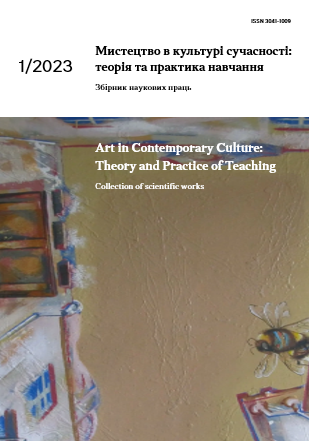Methods of applying innovative teaching technologies in conducting and choral training of future music teachers
Published 2023-10-30
Keywords
- innovative technologies, music education, conductor-choral training, higher school
Copyright (c) 2023 Kateryna Kushnir, Hanna Bilozerska, Volodymyr Kovalchuk

This work is licensed under a Creative Commons Attribution 4.0 International License.
How to Cite
Abstract
The purpose of the article is to consider the extent to which innovative technologies are in demand in higher education institutions in the context of studying conducting and choral disciplines and to determine their feasibility, effectiveness, usefulness and prospects for use in the training of future choirmasters. The authors determine the necessity and expediency of forming an innovative space for a number of disciplines based on the use of achievements of communication technologies. They reveal the effectiveness and efficiency, usefulness and prospects of their use in the process of training choral conductors.
The introduction of innovative technologies in educational practice is conditioned by the fact that it should serve as a means of solving some urgent problems of a certain University and pass experimental testing for its final implementation.
One of the types of innovative technologies in such classes is the use of virtual electronic music choral anthology, which is systematized in the form of a table with URL to the music medium, sheet music and text files that are freely available online. Another innovation in the study of the cycle of conducting and choral disciplines is the creation of an intellectual map. This method is appropriate when studying the theory of conducting (its technical component, artistic and expressive, communicative and psychological, managerial and organizational). Along with intelligence maps, there are also so-called web quests, which are aimed at expanding the knowledge of concepts and terms related to understanding the specifics of conducting activities. Distance learning encourages teachers of almost all specialties, including conducting and choral specialties, to introduce such a form of work as a webinar. Often in the process of studying conducting and choral disciplines, students undergo so-called socio-psychological training.
Practice shows that today the use of some of the latest technologies in the context of studying conducting and choral disciplines in higher education not only stimulates the activity of students in the educational process, but also gives it an innovative appeal. At the same time, they contribute to the creation of a creative atmosphere in the seminar-type classes, provide an opportunity for self-realization of creative potential when students perform independent work, thereby improving the quality of learning material.
Downloads
References
- Василевська-Скупа Л., Слободиська О. Підготовка майбутніх учителів музичного мистецтва до соціокультурної діяльності засобами інноваційних технологій. Сучасні інформаційні технології та інноваційні методики навчання в підготовці фахівців: методологія, теорія, досвід, проблеми. 2020. Вип. 56. С. 90-96. https://doi.org/10.31652/2412-1142-2020-56-90-96
- Докучаєва В. В. Теоретико-методологічні засади проектування інноваційних педагогічних систем : автореф. дис. ... д-ра пед. наук : 13.00.01 / Докучаєва Вікторія Вікторівна ; Луган. нац. пед. ун-т ім. Тараса Шевченка. Луганськ, 2007. 44 с.
- Інноваційні педагогічні технології: теорія та практика використання у вищій школі : монографія / І. І. Доброскок, В. П. Коцур, С. О. Нікітчина [та ін.]; Переяслав-Хмельниц. держ. пеяд. ун-т ім. Г. Сковороди, Ін-т пед. освіти і освіти дорослих АПН України. Переяслав-Хмельниц.: Вид-во С. В. Карпук, 2008. 284 с.
- Інновації у вищій освіті: проблеми, досвід, перспективи : монографія / П. Ю. Саух [та ін.] ред. П. Ю. Саух. Житомир : Вид-во ЖДУ ім. І. Франка, 2011. 443 с.
- Кушнір К.В., Белінська Т.В., Білозерська Г.О. Використання інноваційних технологій навчання в контексті вивчення диригентсько-хорових дисциплін у вищій школі. Наукові записки Вінницького державного педагогічного університету імені Михайла Коцюбинського. Серія: педагогіка і психологія. Вінниця: ТОВ «Нілан-ЛТД» 2020. Вип. № 63. С. 123-127. https://doi.org/10.31652/2415-7872-2020-63-123-128
- Лисенко М. В. Інноваційна парадигма вищої освіти України за умов переходу до інформаційного суспільства : автореф. дис. ... канд. філос. наук : 09.00.10 / Лисенко Микола Владиславович ; М-во освіти і науки, молоді та спорту України, Нац. техн. ун-т України «Київ. політехн. ін-т». К., 2013. 16 с.
- Про вищу освіту : Закон України від 1 лип. 2014 р. No 1556 – VII. Офіц. вісн. України. 2014. N 63. С. 1728.





